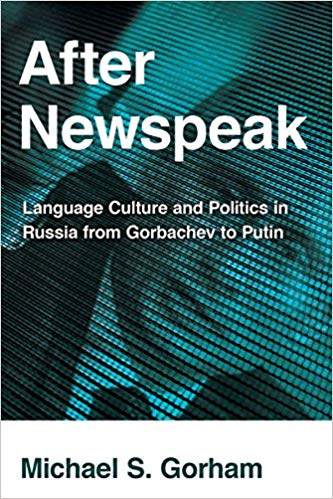
After Newspeak: Language Culture and Politics in Russia from Gorbachev to Putin
Michael S. Gorham
Michael S. Gorham, Associate Professor of Russian Studies in Languages, Literatures and Cultures. Available from Cornell University Press.
In After Newspeak, Michael S. Gorham presents a cultural history of the politics of the Russian language from Gorbachev and glasnost to Putin and the emergence of new generations of Web technologies. Gorham begins from the premise that periods of rapid and radical change both shape and are shaped by language. He documents the role and fate of the Russian language in the
collapse of the USSR and the decades of reform and national reconstruction that have followed. Gorham demonstrates the inextricable linkage of language and politics in everything from dictionaries of profanity to the flood of publications on linguistic self-help, the speech patterns of the country’s leaders, the blogs of its bureaucrats, and the official programs promoting the use of Russian in the so-called “near abroad.”
Gorham explains why glasnost figured as such a critical rhetorical battleground in the political strife that led to the Soviet Union’s collapse and shows why Russians came to deride the newfound freedom of speech of the 1990s as little more than the right to swear in public. He assesses the impact of Medvedev’s role as Blogger-in-Chief and the role Putin’s vulgar speech practices played in the restoration of national pride. And he investigates whether Internet communication and new media technologies have helped to consolidate a more vibrant democracy and civil society or if they serve as an additional resource for the political technologies manipulated by the Kremlin.
“This fascinating book offers a sweeping analysis of Russia’s changing ‘language culture’ in the past several decades, from the politics of language use and debates over language norms to the role Russian language plays in national identity, political culture and international relations. But this is more than a book about language culture. From the stagnant discourse of post-Stalin’s Soviet Union to the exciting linguistic openness of Gorbachev’s perestroika, from the violent linguistic experimentation of the first post-Soviet decade to the authoritative linguistic grip and chaotic online utopia of Putin’s years, this book provides an extraordinary perspective on Russia’s cultural and political history.”
—ALEXEI YURCHAK, UNIVERSITY OF CALIFORNIA, BERKELEY
AUTHOR OF EVERYTHING WAS FOREVER, UNTIL IT WAS NO MORE: THE LAST SOVIET GENERATION